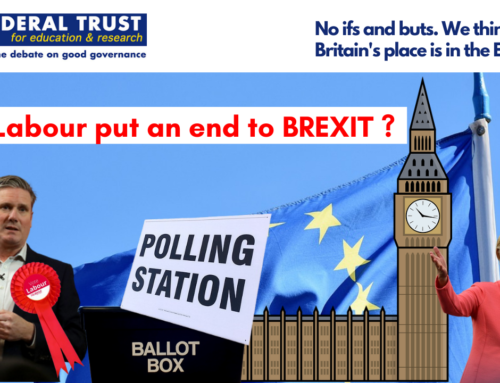This article was first published on Sceptical Scot.
Thirty years ago, on October 3 1990, I was standing among a million people in front of the Reichstag building in Berlin observing and reporting on the ceremonies celebrating the rebirth of a united Germany.
A streaker briefly interrupted the profoundly good-natured, often low-key event in the run-up to midnight when President Richard von Weizsäcker, accompanied by Kohl, Genscher et al, ended 45 (strictly speaking 41) years of the country’s division into West Germany and the GDR.
Three decades and €2trn later, after years of mutual distrust and occasional loathing across the two communities (Die Mauer in den Köpfen/the Wall in their heads), commentators like syndicated columnist Gwynne Dyer are gushing: “But if you only consider countries with more than 50 million people, then Germany today is the fairest, the least conflicted, the most peaceful, actually the nicest major country on the planet.”
John Kampfner, who was there in 1990 too (for the Telegraph), has now written a 300-page paean, Why the Germans Do it Better, in which he goes further (P175):
With the credibility of the US and UK undermined, Germany has found itself in the deeply uncomfortable position of being the standard-bearer for liberal democracy. It is the cornerstone of Europe…
And (P281):
Germany is Europe’s best hope in this era of nationalism, anti-enlightenment and fear…Who will represent European values in a fast-changing world? Who will stand up to authoritarian regimes? Who will make the case for liberal democracy? Germany can, because it knows what happens when countries fail to learn the lessons of history.
Kampfner’s well-researched (via a copious cuttings library), engaging history or love-letter is often, in real terms, an angry repudiation of what the UK (and US) has become in the intervening period: a “global leader in wartime obsessions,” mired in self-aggrandising post-imperial delusions and in hock to corrupt global finance. A failing, rogue state.
Growing up
All true but, if you want a more critical analysis from a German observer, Jürgen Habermas’s possibly valedictory essay (he’s 91) is a useful antidote ( Year 30: Germany’s Second Chance). It looks back over the same period highlighting the setbacks, problems and tensions as those two communities, which came of age in very different societies and with very different mindsets, falteringly joined together as a people.
Back then, it struck this long-standing Germanophile that the Bonn Republic as it was known simply took over East Germany and recreated itself in larger form as the Berlin Republic, with no change to its constitution, political ideology, economic structures or social conservatism. East Germans, as Habermas says, were afforded no public space to re-evaluate their past role and/or identity under, first, Nazism and, then, communism. Let alone bring their ideas to the party.
Even today, after all that injection of funds and with an Ossi, Angela Merkel, as its arguably most successful chancellor, east Germans barely figure in the C-suite of politics, economics, business, higher education etc. Their incomes (and productivity) remain below that of their western cousins. And, what’s more, long-standing west German issues remain unresolved.
These include demography/ageing (helped by Merkel’s generous gesture of allowing 1m refugees to enter and settle in 2015 alone that does indeed contrast with Priti Patel’s crude and cruel treatment of 7000 (sic) migrants in makeshift cross-Channel boats). Income inequality is on the rise. Despite the recent fiscal relaxation, ordonomics remains the dominant economic theory, encapsulated in the obsessive pursuit of the schwarze Null or balanced budget that blinded Germans to the crumbling of their national infrastructure. The enormous export success of German industry – putting aside its destabilising (macro imbalance) effect upon the eurozone economy – also blinded them to its gradual falling behind the Americans and, not least, Chinese in technology. German administrative structures and procedures creak with old age.
Habermas, a grand European who had lost a lot of faith in the Project, has been revitalised by Merkel’s decision to side with Emmanuel Macron, break with the ‘frugals’ and endorse debt mutualisation within the new €750bn EU recovery plan (at least for the time being but maybe longer as the pandemic shows no sign of abating.) France and Germany, while the UK continues to decline, share a belief in European “sovereign autonomy” in industry/technology/AI and the like. After a decade in the post-financial crisis of imposing a “German Europe” on the eurozone/EU via austerity Merkel has reverted to the “European Germany” of her one-time mentor Kohl.
Germany, even if one goes as far back as Bismarck and 1871, is a relatively young country and, in its latest iteration, highly attractive to a lot of Europe’s youth. It does offer, then, a model for any nascent Scottish republic: open, tolerant, European, nationalist in a civic, secular sense. But, as its friends, including Kampfner, acknowledge, it faces significant challenges now and in future.
There is evidence that the far right AfD (Alternative für Deutschland) has lost ground this year (down to 10%), not least because of internal strife, but it remains a factor in German politics. The German judiciary’s record in dealing with neo-Nazis such as the NSU, as Habermas points out, is patchy at best. There are, however, no grounds for fearing a resurgence of Blut und Boden fascism but plenty of reason to be alert – as we should be here – to signals that the alt-right is successfully exploiting the new divisions brought by an economically unstable, fearful world.





